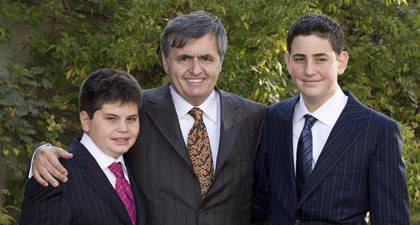TORONTO — David Geneen needs a hero, one who could save his life with hardly more than a cheek swab and ultimately, a blood stem cell donation.
Saving a life doesn’t get much easier than that, but finding the right match can be a lot harder.
Geneen, 64, the retired former owner of Grand Touring Automobiles, a car dealership in Toronto, explained that he suffers from myelodysplastic syndrome (MDS), a rare, pre-cancerous blood disease that is chronic and ultimately fatal.
“I was always exhausted and I didn’t know why. I thought, it’s pressure from work, anxiety, my mother had passed away and it seemed to happen after that, so I thought, maybe I’m just not coping well,” said Geneen, who began looking into his symptoms in 2007.
“It turned out there was something wrong.”
His doctor discovered that his blood production was abnormal, and after ruling other causes out, he was diagnosed with MDS.
He said his medications had been successful in staving off the disease until recently.
“The drugs have started to wear off, and I’m needing transfusions more often.”
A stem cell transplant is the only treatment that can cure MDS.
The good news is that while other blood disorder sufferers can only hope to go into remission after a successful stem cell transplant, MDS patients can be cured completely.
Geneen and his family hope that an upcoming stem cell drive at Holy Blossom Temple on March 25 will result in his match, putting this deadly disease behind him.
But Geneen understands that the odds are against him.
“Because I’m Sephardic, the chances of a match are even lower… Sephardis are harder to match,” he said.
Since no one in his family was a match (the odds of a familial match is only 30 per cent), they decided to appeal to the members of the Jewish community – his best chance at finding a donor.
“I’m not really sure if anything can come out of this for me, but if we can get a couple thousand swabs, that’s 2,000 more people who could become donors [for others],” Geneen said.
Lucy Waverman, Geneen’s sister, organizer of the stem cell drive, and food columnist for the Globe and Mail, said she’s been eagerly spreading the word about the drive through Facebook and by circulating an e-mail containing a plea from Geneen’s two sons, Daniel and Julian.
“We love our dad more than you can imagine. He’s always been there for us, and now it’s our turn to be there for him. We can’t imagine life without him,” the letter said.
Waverman said she teamed up with OneMatch, the stem cell and marrow network, which will provide enough kits to register 500 people at the drive.
“They’ll have more kits available if they see they’re running out,” she said.
As an incentive to the potential donors, Waverman said she and her “foodie friends” will be providing homemade baked treats.
“We’re trying to get people to stay, have a cup of coffee, dessert, talk to David, talk to me,” she said.
Truthful Lies, a local band, will also be performing during the event, in hopes of attracting the younger crowd.
“My cousin, who works at Universal Music, will also be hauling in all sorts of CDs to give away,” Waverman said.
But more important than enticing crowds with the promise of baked goods and music is dispelling the myths about stem cell donation.
People are often hesitant to register at stem cell and bone marrow drives because of a misconception that donating stem cells and bone marrow is a painful process, Waverman said.
She explained that the process begins with a cheek swab – a cotton swab is rubbed against the inside of your cheek. In the unlikely event that you are a match, if you agree to move forward with the process, you’re required to do a physical exam to make sure you’re healthy.
According to the OneMatch website, if you pass the physical, you’ll register at a hospital as an outpatient and have your blood drawn. The blood passes through a machine that separates the stem cells so they can be transplanted into the patient. The filtered blood is returned to the donor through the other arm.
“You’re only in the hospital for a few hours and then you get to go home,” Waverman said.
Although Geneen is acutely aware that the odds of finding a match may not be in his favour, he said he’s grateful for the new perspective his ordeal has given him.
“When going through something like this, it’s easy to become self-centred, but this has helped me get outside myself and think, maybe I can help someone else if not myself.”
Waverman is optimistic.
“He’s a real fighter and he goes to the gym every day… and he’s determined,” she said. “I have great admiration for him. He wants this.”
The drive is being held at Holy Blossom Temple on March 25 between 12 p.m. and 4 p.m. Alternatively, a cheek-swab kit can be sent to your home by visiting OneMatch.ca.
